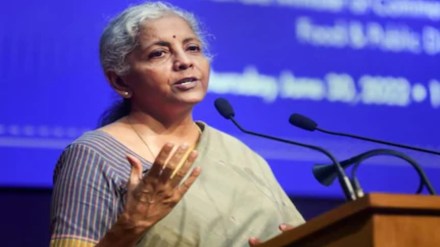A ballroom full of industry leaders and leading Indian bankers and many across the country peering into their mobile phones heard finance minister Nirmala Sitharaman deliver her address at the just concluded Financial Express Best Banks Awards in Mumbai. The minister articulated the transformational journey of the Indian banks from a once-troubled state to spectacular symbols of smart systemic changes with performance and profitability attracting global recognition.
In her address and in the course of her interactions at the awards evening, the finance minister referred to the motley of schemes unfolded by the Modi government and how every facet of banking was touching Indians and transforming the way businesses were conducted. Turning India into a land of a billion bank accounts, a billion mobile phones and a billion digital identities. Access to digital investment platforms changing the way Indians save and invest. India today, she reminded, has 17.1 crore DEMAT accounts as of September 2024 as against 2.31 crore in 2014 – a seven fold increase in a decade. In the same timeframe, the number of unique mutual fund investors has seen a four-fold increase to four crore at the moment.
But speak to the leaders from India Inc., and while many are impressed by the over 50-odd “worthy schemes” of the government – from PM Poshan Shakti to PLI (Production Linked Incentive) scheme, start-up India to stand-up India, Ujala to UDAY and many more, they argue that since schemes are not reforms, clarity on the contours of reform agenda is more crucial today than ever. They worry if privatisation, land and labour reforms, financial sector reforms and trade opening are all off the table?
Vibrancy in jobs mkt to Conducive Labour laws
While the finance minister invited the industry leaders, banks and financial institutions to participate in the “internship programme” launched by the government which will help the youth get job-ready, to the industry, the answer also lay in setting in motion set of things that will make employment more vibrant through conducive labour laws, removing obstacles to the growth of labour-intensive garments and tourism (like urban land use regulations).
Education de-regulation
Second, the whole area of education deregulation both school and especially higher education. To truly implement National Education Policy (NEP) in letter and spirit. Third, a thrust on research spending. The finance minister did talk of the last two budgets and the push in them for greater research spending and the creation of the “Anusandhan Kosh” to support long-term financing for research and innovation in select domains. The industry however, hopes to see a change in areas where the government spends its research budget – from autonomous labs to higher education. Fourth, to many in the industry, the Ease of Doing Business in its true sense is when the existing firms see it well beyond the “window displays.”
Trade reforms & More
Also, articulation of specifics on trade reforms – to bring tariffs down and open up more and more sectors to duty-free imports. All of it as components of the reform agenda that has both financial sector deregulation and a massive privatization programme.
Inter-regulatory coordination
While the finance minister had a good word for the Indian financial regulators and their globally recognised regulatory oversight, those within the industry find Inter-regulator coordination rather poor if not “reactive” at its best. On KYCs for instance, what could be holding back from making an entity like the CERSAI (Central Registry of Securitisation Asset Reconstruction and Security Interest or a depository to be a single point KYC owner.
Unified Data Infrastructure
One industry leader, like the others, who did not wish to be named, refers to “the Reserve Bank of India (RBI) announcement on ULI (Unified Lending Interface) and asks: “Should it not instead be doing a Unified Data Infrastructure (UDI) which everybody could use, especially exposing government records such as land records or any dispute over land starting with the revenue officer going up to the Supreme Court? This, to him, “would also be in line with the finance minister’s statement three years ago on the creating of a National Financial Information Repository or NFIR announced in the budget then.”
